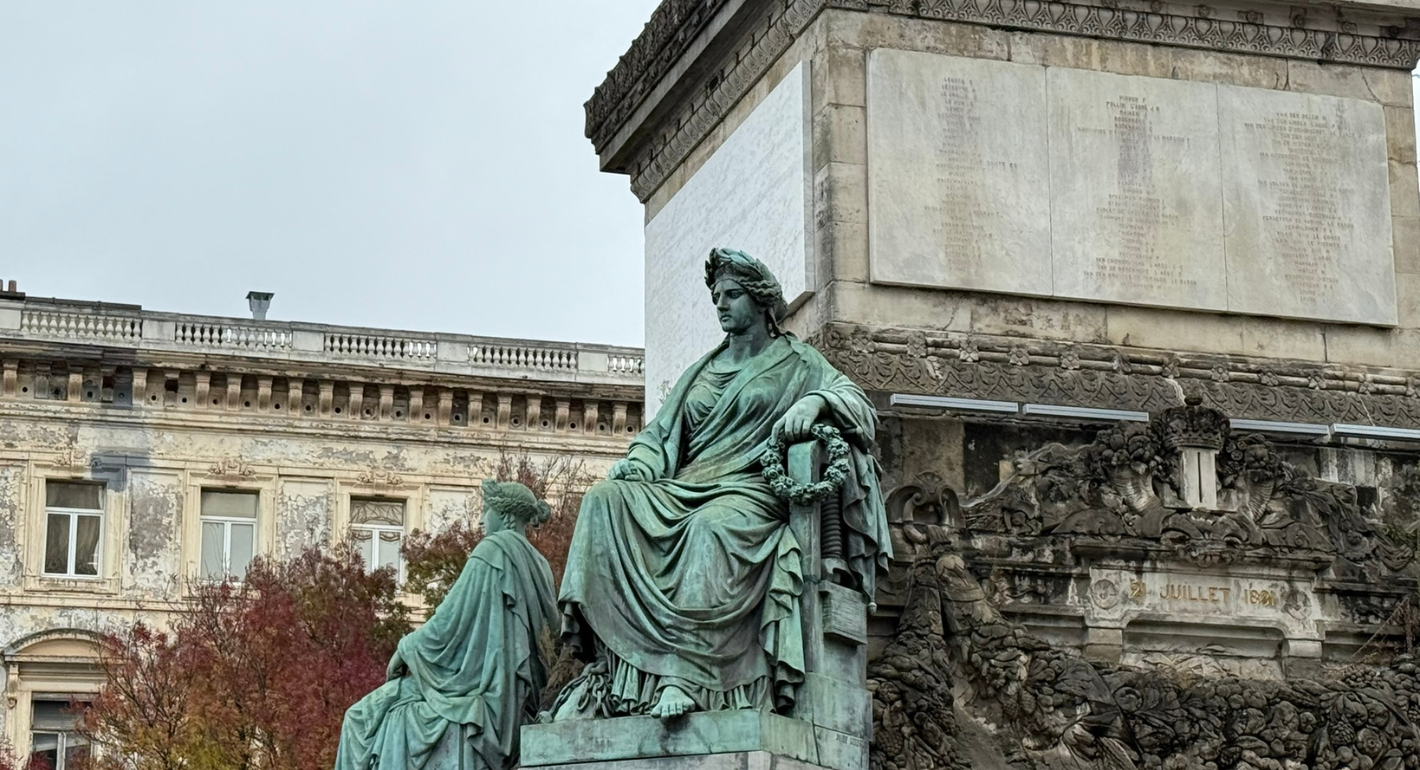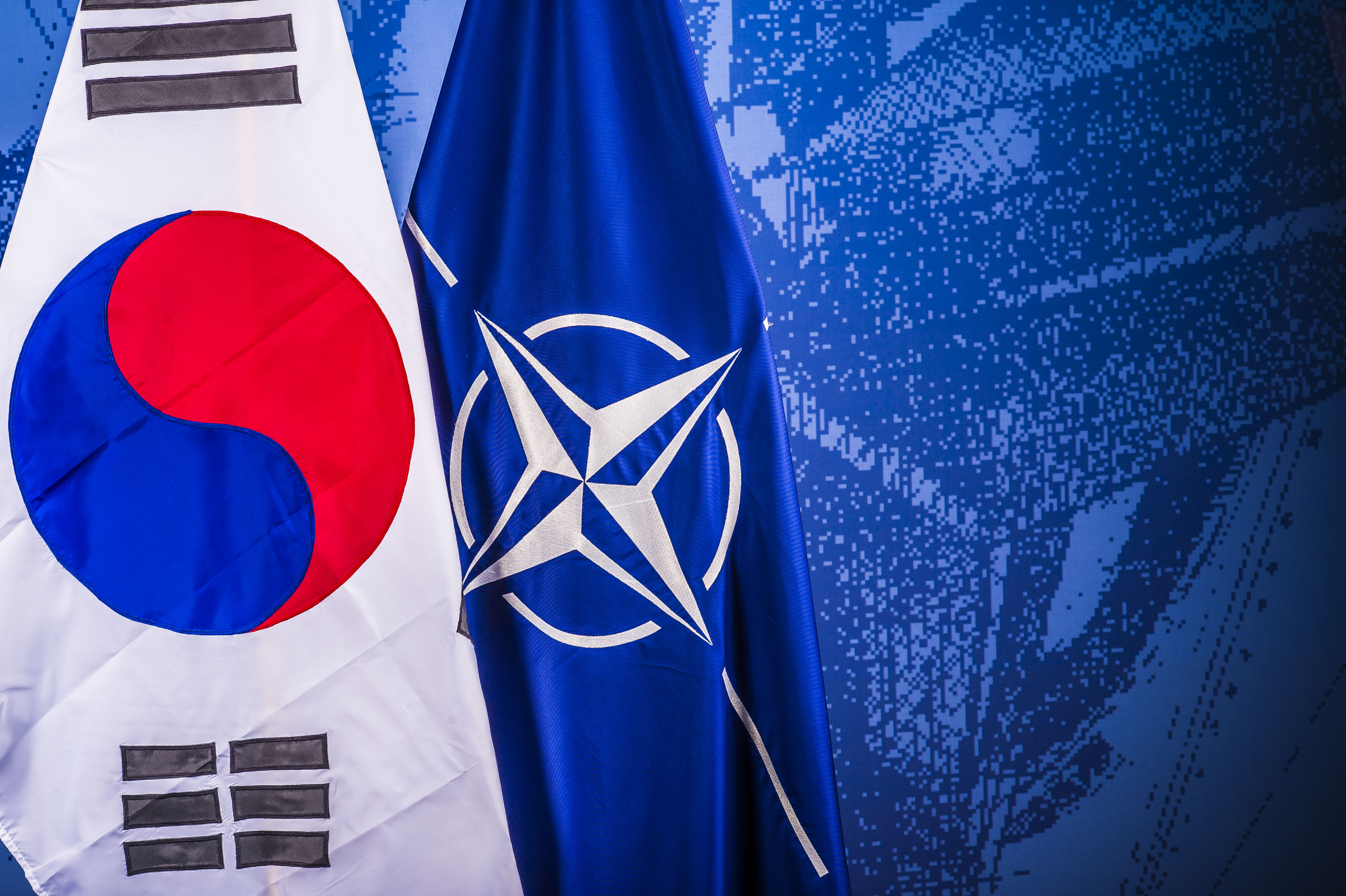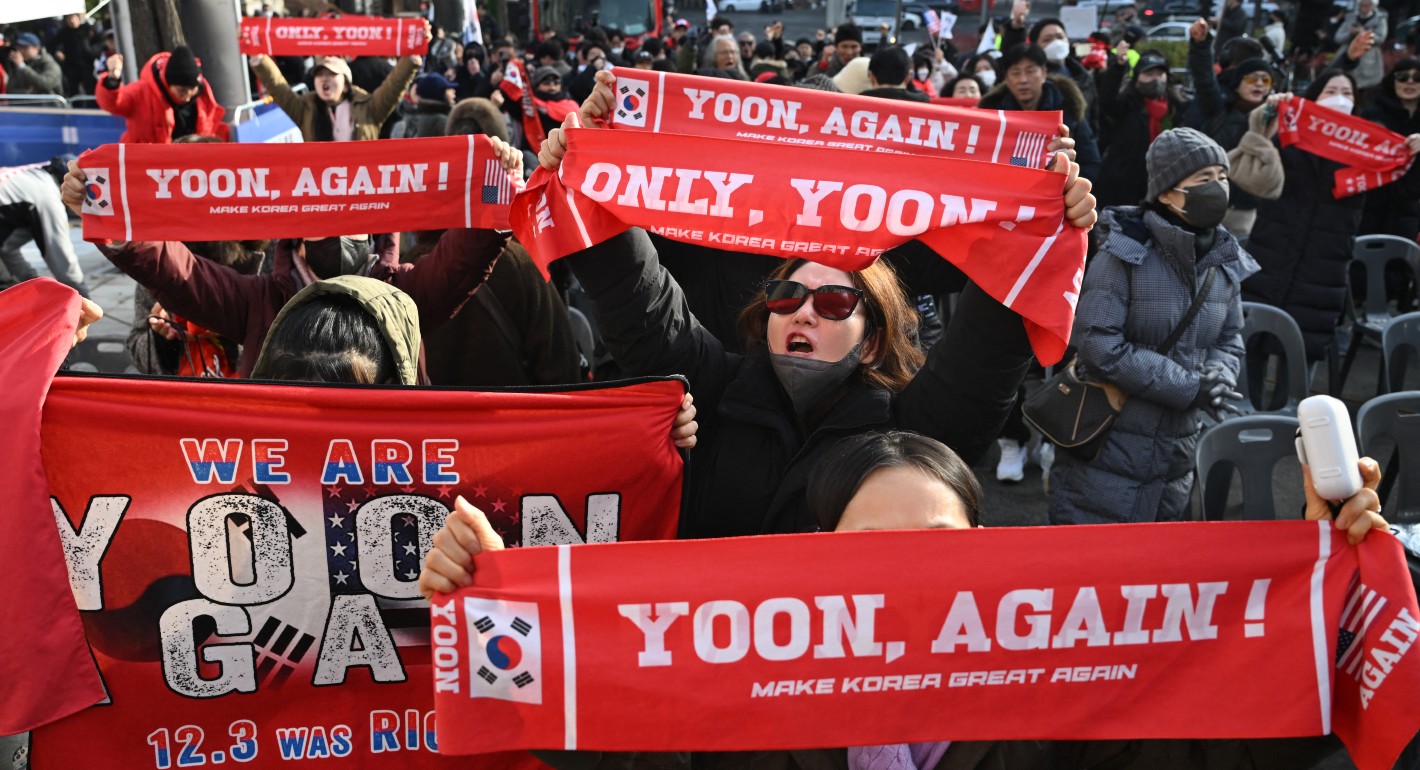Caught between Russia’s war in Ukraine, a disruptive U.S. president, the rise of hard-right parties in Europe, and the continent’s struggle to influence world events, European citizens are often confused. But they may have different reasons for their confusion. Here, two members of the Carnegie Europe team, born forty-nine years apart and hence with different experiences and contrasting perceptions, voice their common belief that the values developed by Western European states over the past eighty years are still worth fighting for.
A Baby Boomer’s View: In the Shadow of War
Marc Pierini
Born in Marseille in 1947, I was raised amid memories of World Wars I and II. My parents and their friends would endlessly rehearse tales of their pain, loss, scarcities, and defiance of Germany. My maternal great-uncle had been a frontline gunner at Verdun; he went to war in 1914 and came back in 1915 as a Gueule Cassée (“broken face,” in the official terminology) and spent a lifetime mumbling about the assaults launched out of the trenches.
Memories of World War II were even more present: My father was condemned in 1940 for helping Italian fugitives who opposed fascist leader Benito Mussolini (he was rehabilitated in 1945), while my uncle led a group of freedom fighters in the Alps. Family stories evoked lost Jewish friends, fighting during the liberation of Marseille, food rationing in the immediate afterwar period, and years-long waiting lists for new cars.
My initial exposure to international affairs was therefore mostly about wars, including France’s postcolonial conflicts in Indochina and Algeria. Generally speaking, for a modest family like mine, access to information was limited. Apart from the occasional weekly magazine, we knew little about major news outside France. The development of the European Communities, the EU’s predecessor, wasn’t much discussed, except when France’s agriculture minister explained that he had “imposed on Brussels” good prices for French farmers—or, conversely, that bad prices had been “imposed by Brussels.” It was hard to tell what “Brussels” really meant and whether it worked for the common good.
At university, I was finally able to connect with Brussels when gathering information for a dissertation during the UK’s 1970–1972 accession negotiations. I discovered a new world that was the exact opposite of the resentment and defiance I had heard for nearly two decades: hundreds of officials and diplomats working with dedication to unite the economies of nine small to medium-sized European countries and give this community a set of decisionmaking processes and institutions. It was the biggest peace project the continent had ever witnessed, a translation of the mantra of “never again” into a set of rules for European governments.
A while later, I joined the European Commission—the system’s executive branch—and spent more than thirty-five years in various external relations positions. During these years, I worked to apply these rules to the community’s relations with its neighboring countries. I was implementing what I had studied. The fascinating process unfolding in Brussels and European national capitals was the deliberate transformation of conflict, death, and hatred into a set of agreements to organize the continent’s reconstruction, economic relations, democracy, rule of law, peaceful neighborly relations, and international cooperation. This was the European version of a rules-based international order.
Not all was rosy during these thirty-five years, though. When posted in Rabat, I witnessed irregular migration from sub-Saharan Africa and crises in agricultural exports to Europe; in Damascus, I learned up close how a ferocious dictatorship worked, despite the fleeting Damascus Spring in 2000–2001; in Tunis, I saw the courageous actions of Tunisian civil society activists but was almost expelled for talking too much about human rights (despite it being in my mandate to do so); and in Ankara, I witnessed not only an extraordinary appetite for EU-inspired economic and social reforms but also the consolidation of an autocratic governance model and the steady decline of democratic values.
Everywhere, large segments of the population were longing for freedom of expression, women’s rights, free and fair elections, cultural rights, access to education, and economic opportunities. Clearly, the set of values promoted by the EU was shared by many. And still is today.
Yet, despite a constant willingness to export their values-based model, European leaders were unable to prevent the descent into chaos of Lebanon, Syria, and Tunisia or the systemic degradation of the rule of law in Turkey. The Israeli-Palestinian conflict has tragically gone from bad to worse since 1948, with European leaders utterly unable to promote a peaceful coexistence of the two peoples. Since February 2022, Russia’s unprovoked invasion of Ukraine has represented a huge challenge for the EU and triggered intense internal negotiations to forge a consensus on sanctions, support Ukraine economically and militarily, and face an aggressive dictatorial regime.
Fast-forward to 2025, and Donald Trump’s return to the White House—with his signature playbook of copious social media statements, the marginalization of critical media, and extensive use of executive orders—has created a huge disconnect with Europe. Having morphed from ally to bully, the second Trump administration continues to catch European leaders off guard with its unilateral tariffs, disregard for EU powers, lectures on values, interference in European national elections, and threats of land grabs.
Together with Trump’s connivance with Russian President Vladimir Putin’s imperialist dictatorship, this shift has almost instantaneously upended several pillars of what for the past eighty years has been known as the Western world. What is more, Europe’s autocrats and far-right parties have taken pride in boasting of their closeness to Trump, while leaders in Hungary, Serbia, Slovakia, and Turkey have adopted slogans similar to those used in the United States—or vice versa.
Despite the difficulty of such comparisons, what is happening in the United States is all too reminiscent of the trajectories of Germany and Italy between the two world wars and of the massive degradation in the rule of law that has been witnessed for years in Hungary, Serbia, and Turkey. And for my generation, the policies of Trump (born in 1946) and Putin (1952) are all the more worrying.
A Millennial’s View: A Pessimistic Generation?
Cyrine Drissi
The widely accepted definition of millennials, or Generation Y, encompasses those born between 1981 and 1996. This cohort is often described as the first to have grown up with technology, which is why we are frequently referred to as digital natives. By contrast, members of the previous generation are sometimes called digital immigrants, as they were not born into the digital age. While our parents were already in their mid-twenties when the internet and personal computers became widespread, we were still teenagers—or younger. Unlike Gen Z, born between 1997 and 2012 and raised in a fully digital world, millennials experienced the transition as it unfolded.
Millennials also witnessed the event that would change the world as their elders knew it: the September 11, 2001, terrorist attacks. For many in this generation, 9/11 and the Iraq War that followed marked the beginning of our political awareness and went on to shape our collective identity.
At school, we were taught about the EU’s founding values: human dignity; freedom of movement, religion, and expression; democracy; equality; human rights; and the rule of law. These ideals carried weight and offered reassurance to young Europeans. Yet, alongside this vision of peace and progress arose a dissonant question: If this was the most ambitious supranational project in history, designed to promote peace within its borders and beyond, why did the world around us still feel so violent?
Millennials were also the key demographic behind another tool that would trigger a seismic shift in everyday life in the twenty-first century: social media. With the advent of platforms such as Facebook, Twitter (now X), and YouTube, the way information was consumed changed dramatically. Major news outlets around the world quickly adapted by digitizing their content, launching websites, uploading their archives, and sharing articles online.
Social media soon proved to be more than just a communication tool. One of the most striking early examples of its political impact was the 2010–2011 Tunisian Revolution, which I witnessed firsthand as a teenager. What began as local protests against authoritarian rule quickly grew into a nationwide uprising, in large part thanks to the ability of online platforms to spread information, mobilize people, and bypass state-controlled media.
Throughout the revolution—and the broader Arab Spring that followed—networks like Facebook played a central role in sharing updates on the movements of regime forces, circulating images of demonstrations, and coordinating neighborhood barricades, which residents organized for their own security. For the first time in history, social media was instrumental in a mass political movement, revealing one of the defining truths of the twenty-first century: For better or worse, socialization and political discourse increasingly happen online.
Millennials came of age during the 2007–2009 Great Recession and later faced the economic fallout of the COVID-19 pandemic—two major crises that hit during pivotal stages of our lives, just when previous generations were buying homes and accumulating wealth. Instead, we were met with skyrocketing inflation, stagnant wages, and a housing market that was increasingly out of reach.
These material conditions didn’t just shape our personal lives; they also shaped our politics. Governments faced more scrutiny than ever, fueling growing distrust from the public. The rise of video-sharing platforms deepened political divides. Disillusioned with institutions that failed to protect us, millennials increasingly abandoned traditional party politics as the far right gained ground across Europe, especially with younger voters.
In the 2024 French legislative election, a stark generational divide emerged. Among twenty-five- to thirty-four-year-olds, 38 percent voted for the left-wing New Popular Front, as did 31 percent of thirty-five- to forty-nine-year-olds—two age groups that together roughly represent millennials. Older generations, particularly baby boomers, largely backed conservative or far-right parties. Notably, President Emmanuel Macron’s centrist party drew its strongest support from boomers, with 21 percent of the vote among those aged sixty to sixty-nine and 32 percent of the vote among those over seventy.
But what about younger voters who cast their ballots for the far-right National Rally? Counterintuitive as it may seem, this group represents the other side of the coin: Among younger millennials, Jordan Bardella’s party came a close second, pointing to another reality. Whether the far right’s votes come from educated, politicized young people or working-class youth in small towns and rural areas, younger generations appear more drawn to the political extremes—on either the right or the left—than to traditional, seemingly more moderate parties.
Millennials are often called a pessimistic generation because of our perspective that is shaped by constant exposure to systemic dysfunction. Meanwhile, Europe continues to uphold moral and humanist values that may feel increasingly hollow to younger generations. How ironic that the generation that once believed most in these ideals may be the one to dismantle them.
Still, the picture isn’t entirely bleak. In response to these democratic and social setbacks, resistance has grown stronger. If boomers had movements like Woodstock, younger generations have spearheaded initiatives such as MeToo, Black Lives Matter, LGBTQ rights campaigns, and a global wave of climate activism. Over the past two years, the conflict in Gaza has emerged as a central cause internationally, highlighting a generational divide more clearly than other issues.
In the United States—the country that has been Israel’s strongest supporter since the 1950s—generational divides are increasingly visible. A September 2025 poll showed that 67.5 percent of respondents aged eighteen to forty-five disapproved of President Donald Trump’s handling of the Israeli-Palestinian conflict, compared with 49 percent of boomers. This marks a significant shift from 2015, when overall U.S. support for Israel stood at about 65 percent.
Younger generations have historically been more inclined to challenge established orders and mobilize for change, while older cohorts tend to favor continuity and the status quo. The current debate over Israel and Palestine reflects this broad pattern: The youth are more willing to question long-standing alliances and policies, whereas older generations remain anchored on traditional positions shaped by Cold War legacies and decades of bipartisan consensus. All hope is not lost.
Where to Go from Here?
Both authors
Across Europe and the world, committed individuals and organizations are defending human rights, the rule of law, and the freedom of expression even in the most difficult circumstances; witness the crowds on the streets of Belgrade or Budapest protesting against well-entrenched autocratic leaders, or opposition politicians and young citizens resisting Turkey’s system of one-man rule. Globally, many of the 160 antigovernment protests recorded in 2024 were related to election grievances.
By contrast, there are also Western leaders working hard against liberal values. On March 6, Hungarian Prime Minister Viktor Orbán, after a dinner in Paris with Macron, boasted that he had a meeting with the far right’s Marine Le Pen, whom he called “the future president of France.” The month before, billionaire entrepreneur Elon Musk was actively promoting the leader of the far-right Alternative for Germany (AfD) during that country’s legislative election, while lambasting the EU. Worst of all, at the Munich Security Conference, U.S. Vice President JD Vance lectured European leaders on the freedom of expression.
Perhaps the most closely watched conflict today is the ongoing war in Gaza. As the humanitarian catastrophe deepens and Israel has continued its military operations with apparent impunity, faith in the so-called rules-based international order is eroding rapidly among all generations. A growing sense that international norms are applied selectively—or ignored altogether—is compounded by military escalations in Lebanon, Syria, and Iran, raising pressing questions about the credibility and legitimacy of the system meant to uphold peace and accountability. Developments across the Middle East illustrate how the combination of U.S. and Israeli authoritarian governance and undisputed military and intelligence capabilities results in huge suffering for ordinary citizens, diplomatic deadlock, and a freezing out of other international actors.
Closer to home, there is an even more crucial dimension. Tensions between the West and the Global South have serious repercussions in Europe, fueling extremism and the rise of the far right. In France, where migration dominates the political discourse, second-generation immigrants—European citizens born and raised in the country—face harsher racism than their boomer or Gen X parents, who arrived as immigrants decades ago. In an increasingly fractured world, it’s hard not to question the ideals that once seemed so attainable. Millennials grew up in a time of rapid technological advances, unprecedented global interconnectivity, and idealistic promises of peace and democracy. Yet today, these ideals often feel out of reach, overshadowed by rising political extremism, economic instability, and a crisis of trust in institutions.
Perhaps the real irony is that the generation most dedicated to these values may also be the one most disillusioned with them. This sense of disillusionment is often framed as a generational divide—millennials as the progressive force pushing for human rights, social justice, and climate action, and boomers as indifferent to the values they once championed. Yet, the reality is more complex: There are also conservative millennials and progressive boomers; rather than stark opposition between the generations, it is more a question of overlapping currents of thought and experience.
What matters, then, is not simply what separates the generations, but which values unite them. Europe, once the stronghold of postwar ideals, is now confronted with diminishing global influence, and younger and older generations alike are left grappling with how to reconcile aspirations for a better world with today’s harsh realities. At a moment dominated by polarization and reshuffled alliances, the greatest challenge ahead may well be to nurture intergenerational solidarity—rebuilding not only trust in our systems but also a renewed belief in the ideals that define the modern era. An additional challenge is how to counter the tendency to avoid democratic debate of difficult foreign policy decisions and instead confine them to a restricted circle of EU decisionmakers.
For all generations, fighting to protect the rule of law is still the answer. This effort across the generations should be directed at influencing national and EU-level political decisions amid a brutal and unpredictable global environment.













